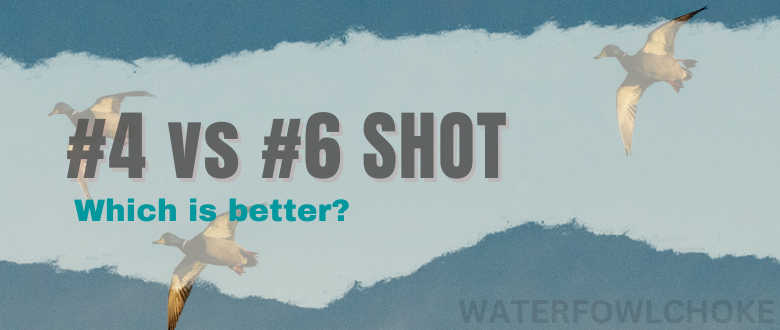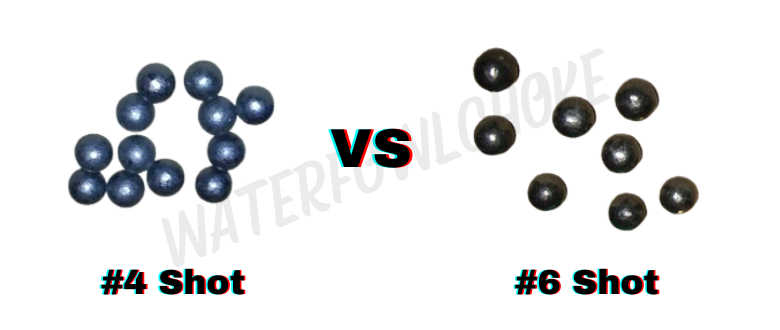4 vs 6 Shot is the hunting debate for the ages

The 4 vs 6 shot comparison is a never-ending debate on which one is best. It will likely never have a real winner, but we’re going to try and help you to find which one will work best for you.
The ballistics of both pellet types— 4 and 6 — are both excellent, but in slightly different ways. Many of their ballistics overlap, but size-wise they look slightly different, aside from the basic round steel pellet design. Whichever shot size you end up buying, these two pellet sizes will be the most popular on the shelf.
Pitting 4 vs 6 shot, we take a look at the respective strengths of each pellet type, so you can pick the right one for the next time you need it for duck hunting or sporting clays. If you want to see the leading choke tubes for these two shot types, be sure to check out the Carlson’s Cremator Choke, Patternmaster Code Black Choke, and JEBS Waterfowl Choke. And if you’re reloading shotshells, read more about pellet sizes and choke diameters.
4 vs 6 shot: Key Differences
- Pellet diameter – 6 shot (0.11”), 4 shot (0.13”)
- Pellet weight – 6 shot (1.39 gains), 4 shot (2.30 grains)
- Pellets per ounce – 6 shot (315), 4 shot (191)
- Effective range – 6 shot (31 yards), 4 shot (38 yards)
- Duck Hunting – 6 shot (15-25 yards), 4 shot (20-35 yards)
6 shot measures 0.11 inch in diameter and 4 shot measures 0.13 inch. This makes 6 shot 0.02 inches smaller in diameter than 4 shot. When individual pellets are weighed, Steel 4 shot measures on average around 2.30 grains and 6 shot weighs closer to 1.39 grains per pellet. This makes steel 4 shot 0.91 grains heavier than 6 shot pellets.
The most important aspect for most hunters is range, and the effective range – or how far a pellet will adequately penetrate a bird’s feathers – is what everyone wants to know. The standard is 600 fps at target or 1.5” of gel penetration needed to kill a duck or pheasant. This makes the effective range of steel 6 shot 31 yards, and 4 shot 38 yards. These ranges make several assumptions, which includes the absence of external limiting factors and the ability to keep a pattern together at max range.
4 vs 6 shot: Ballistics
When the two pellet sizes are analyzed for ballistics, the results are rather surprising for difference in size and weight. Assuming the parameters of 32F, sea level, and 1300fps, 6 retains 600 fps out to 31 yards. The same for 4 shot shows that it maxes out at 38 yards.
| Load Info | #4 Shot | #6 Shot |
|---|---|---|
| Load Weight (grains) | 547 | 547 |
| Muzzle Velocity (fps) | 1300 | 1300 |
| Target Range (yds) | 38 | 31 |
| Velocity at Target (fps) | 600 | 600 |
| Penetration (inch) | 1.01 | 0.78 |
6 shot penetrates 0.78” at its max effective range, while #4 shot penetrates 1.01”. 4 shot retains effective energy for 7 yards further or 21 feet. This is a considerable range increase when it counts for longer shots.
More Shot Size Comparison Guides
Shot size comparisons for the most popular pellet types. From small lead upland game loads to large game buckshot pellets. Find out how similar pellet sizes compare ballistically. Please click the links below to see the effective range of each pellet to determine which one you should hunt with.
Why 6 Shot is better
6 Shot Pellet Size. The diameter of a #6 shot pellet is 0.11” or 2.79 mm. This is 0.02” or 0.51 mm smaller than 4 shot. While this may not seem like a huge amount, the difference can be seen visually when the two pellets are put side by side. A smaller pellet means better pattern density and a larger effective spread.
Pattern Density. There are (315) 6-shot pellets in an ounce of steel shot. This means more pellets can fit in a standard 12-gauge hull, thus increasing the number of pellets hitting the target. Most hunters can agree, more pellets in load are a good thing, especially at effective ranges.
Accuracy. The combination of pattern density and larger spread means that 6 shot is more accurate than larger shot sizes since it’s more forgiving. For duck hunting, the chance of a vital hit is still a probability even though the center of the shot may be off target. This is more evident on fast flying game birds.
Availability. #6 shot is one of the most popular shot sizes for duck hunting over decoys and that makes it more likely to be found on sporting goods store shelves or online retailers. The availability of ammo when you need it is a huge factor to consider. It only takes experiencing one ammo shortage to realize that the most common loads, such as 6 shot, are the first to return.
Why 4 shot is better
4 Shot Pellet Size. The diameter of a 4 shot pellet is 0.13” or 3.30 mm. This is two sizes larger than 6 shot. While this may not seem like a huge amount, the difference can easily be seen visually when the two pellets are put side by side. There are (191) 4 shot pellets in an ounce of steel shot, 124 less than 6 shot.
Penetration. 4 shot can penetrate further than lighter and smaller #6 shot. While ballistics show this as being less than an inch at similar ranges, it’s still considerable on medium sized game birds. Duck hunters that plan to push the range of their shots to 35 yards or more, are almost always better off choosing 4 shot over 6 shot.
Longer Range. There are (191) 4 shot pellets in an ounce of steel shot. Larger steel pellets, such as 4 shot, retain their energy longer and fly further than smaller shot. Simple laws of physics apply, and increased range means having to give up pattern density and spread to achieve it. But this is well worth it for longer shots – such as pass shooting – where penetration and range play a key role in clean harvests.
Less wind drift. 4 shot is not immune to wind drift but handles it better than 6 shot. Head and tail winds aren’t a factor in pellet distribution downrange, but crosswinds can wreak havoc on smaller shot. Because 4 shot retains its energy longer, it’s less affected by wind drift, resulting in more pellets on target at range.

Which should you choose?
So then, 4 or 6 shot: Which should you choose? Both pellets have pros and cons, and, as with many purchase decisions, your choice will depend on what you value most.
The range you will be hunting is the greatest factor to consider when choosing. For shots within 25 yards, the difference in pattern density, spread, and penetration will be close enough that little can be gained from the two. The general consensus is to choose #6 shot for teal and small game birds at ranges inside 25 yards for better pattern density.
For longer shots on medium sized ducks and pheasants, 4 shot is the clear choice since the larger pellets can penetrate deeper and excel at ranges close to 35 yards. 4 shot is also less affected by wind drift should there be a stiff crosswind. 4 shot steel loads can also double as both duck and pheasant loads for an all-purpose ammo solution. For combo upland game hunts, 4 shot is what you should pick.
If you’re wondering which chokes you should switch to for 4 shot or 6 shot, there’s no better place to start than our list of the best waterfowl chokes. Whichever choke you pick, just make sure it fits the choke system on your shotgun.
Search Chokes by Gauge
Related
- The Ultimate Shotgun Pellet Size Chart
- Pellet Count Chart Per Ounce
- TSS Pellet Count Chart – Per Ounce
- Buckshot Pellet Count Chart
- TSS Pellet Weight Chart
- Choke Tube Effective Ranges for Waterfowl
- Effective Range of TSS for Turkey Hunting
Latest Posts



